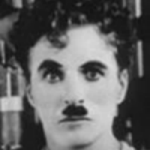 The Comedies of Charlie
Chaplin
The Comedies of Charlie
ChaplinHead-shot of Charlie Chaplin
 The Comedies of Charlie
Chaplin
The Comedies of Charlie
ChaplinThe Count (Sept. 4, 1916), Easy Street (Oct. 2, 1916), The Immigrant (1917)
Comedy is one of those rare areas of human capacity that can stretch across time and place. What was funny in the past is often still funny today. The comedy of Charlie Chaplin is a perfect example of how humor can continue through time. Chaplin's films are relevant today because they deal with an issue pertinent to people of every era: the idea of class consciousness and status. The themes of class, wealth, and social standing play an important part in each of our lives, and Chaplin's comedy pokes fun at all of these issues.
Throughout his films, Chaplin's character is portrayed as a lower-class man, who is trying to climb the social ladder and better his position in society. His dress reflects his attempt to give the appearance of higher social status. His costume has all the elements of a gentleman, however his appearance is ridiculous because the pieces of his suit do not fit together. He wears a bowler hat, and carries a cane, as gentlemen do, but his coat is too tight, his pants are too large, and his shoes are too large - like a clown's. His mustache also gives the impression of an upper-class man, in modern style, but the sophisticated look differs from the long beards of the older, wealthy elite.
The Immigrant
Chaplin attempts to obtain a new life for himself by coming to America. He is a poor immigrant, but tries to appear to be of a higher class in order to impress a woman on board the ship. First he gambles to get more money, intending to keep it for himself, but he ends by giving it to the woman, thus giving her the impression that he is a man of means. Later in the film, they meet again in a restaurant, where he attempts to imitate the manners of a gentleman. He uses his silverware, but he uses it incorrectly, using his knife in place of a fork. He orders food for the woman, making it seem like he can afford spending extra money, but in actuality, he cannot even pay for his own.
The Count
Once again Chaplin is portraying a lower-class citizen in the role of a tailor's assistant. After losing his job, he goes to get food from his mother who works as a cook for a higher-class family, which exemplifies his lower social status. Then he tries to pass himself off as a count to get the attention of a woman by the name of "Miss Moneybags", which implies that he is only interested in her money. Throughout the rest of the film, he competes with his former boss to seem more upper-crust. At dinner he fails horribly when trying to eat watermelon like a gentleman. The watermelon gets on his ears so he ties a napkin around his head, which is a telltale sign of his lack of breeding.
Easy Street
This film opens with Chaplin as a penniless drunk, so immediately he is ranked at the lowest level of society. Next he is seen trying to steal a church's donation box, which confirms his desperate situation. However, at the end of the scene, Charlie is seen as a changed person, because he gives the box back to its rightful owners. The Charlie "who has seen the light" leaves the church wanting to better his social standings in a positive way. His new position in life is shown when he gets a job as a policeman. He takes advantage of his new position by helping a starving woman steal food. This scene shows how Chaplin is now in a position to be charitable to others. Status gained through power is represented in the film by the neighborhood bully, who gains superiority through violence and fear. Later, Charlie defeats the bully, gaining the position of the most powerful on Easy Street.
For Chaplin's views on class click here.